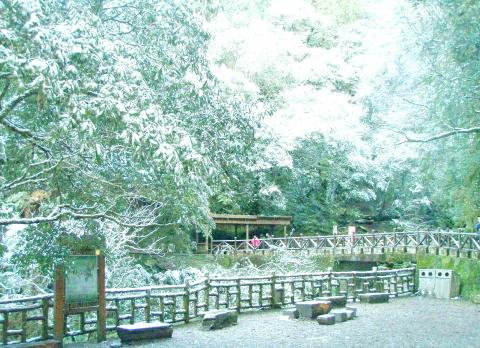The Central Weather Bureau yesterday issued a special warning about low temperatures, heavy rain and strong winds as a cold front shrouded the nation in cold, moist air.
Temperatures of less than 10˚C have been recorded, the bureau said, adding that most areas also experienced strong winds yesterday.
The weather warnings were issued as the strongest cold snap to hit Taiwan in 10 years made its impact felt early yesterday.

Photo: courtesy of the Taoyuan Department of Tourism
At 5:30am a low of 11.7˚C was recorded in Taipei and 1.3˚C on Yushan (玉山).
The cold front is likely to last until Tuesday, the bureau said.
Snow is rarely seen in the nation except on the highest mountains of central and southern Taiwan. With the weather bureau warning of an strong cold front many people began to head for Hehuanshan (合歡山) and other mountains to wait for the expected snow.

Photo: CNA
Early yesterday, up to 350 vehicles passed through a checkpoint close to Hehuanshan, blocking one lane of the highway. The checkpoint was set up to prevent vehicles from going further up the mountain during the night for safety reasons.
The Health Promotion Administration yesterday released tips to prevent cardiovascular illness triggered by the cold weather. The administration said low temperatures can increase blood viscosity, induce vasoconstriction (where the walls of blood vessels narrow and constrict) and increase the risks of intravascular clotting, as well as the likeliness of triggering coronary heart disease.
People with the “three highs” — high blood pressure, high blood lipids and high blood sugar — should remember to take prescribed medication, avoid overeating and severe emotional fluctuations, drink warm water and eat food high in natural fiber to help prevent constipation, it said.
People with the “three highs” are one-and-a-half times more likely to develop heart disease over a five-year period, administration official Chia Shu-li (賈淑麗) said, adding that it is important for the elderly and people with heart disease to keep themselves warm at all times.
She said they should avoid going outdoors for exercise early in the morning when the temperature is extremely low, prepare warm clothes besides their bed before going to sleep so that they can wear them as soon as possible when they get up the next morning.
People who use hot springs should avoid staying in the water for more than 15 minutes to prevent acute cardiovascular events, the administration said, adding that people should also remember to stand up slowly when getting out of hot springs and that people with chronic cardiovascular disease should be accompanied.
The administration said that people with diabetes, hypertension or high cholesterol should keep the water temperature below 40˚C and avoid using hot springs within two hours of eating a large meal or drinking alcohol.
If a person feels sudden chest pain, chest tightness, difficulty breathing or speaking, or experiences numbness or paralysis in the face, legs or arms, he or she should see a doctor immediately, the administration said.

Weather conditions across Taiwan are expected to remain stable today, but cloudy to rainy skies are expected from tomorrow onward due to increasing moisture in the atmosphere, according to the Central Weather Administration (CWA). Daytime highs today are expected to hit 25-27°C in western Taiwan and 22-24°C in the eastern counties of Yilan, Hualien, and Taitung, data on the CWA website indicated. After sunset, temperatures could drop to 16-17°C in most parts of Taiwan. For tomorrow, precipitation is likely in northern Taiwan as a cloud system moves in from China. Daytime temperatures are expected to hover around 25°C, the CWA said. Starting Monday, areas

A Taiwanese software developer has created a generative artificial intelligence (AI) model to help people use AI without exposing sensitive data, project head Huang Chung-hsiao (黃崇校) said yesterday. Huang, a 55-year-old coder leading a US-based team, said that concerns over data privacy and security in popular generative AIs such as ChatGPT and DeepSeek motivated him to develop a personal AI assistant named “Mei.” One of the biggest security flaws with cloud-based algorithms is that users are required to hand over personal information to access the service, giving developers the opportunity to mine user data, he said. For this reason, many government agencies and

The National Fire Agency on Thursday said a series of drills simulating a magnitude 8.5 earthquake would be held in September to enhance the government’s emergency response capabilities. Since earthquakes cannot be predicted, only by continuously promoting disaster prevention measures could Taiwan enhance its resilience to earthquakes, agency Director-General Hsiao Huan-chang (蕭煥章) said in a news release. The exercises would be held to mark annual National Disaster Prevention Day on Sept. 21, the aim of which is to test Taiwan’s preparedness and improve its earthquake resilience in case of a major temblor, Hsiao said. As part of those drills, an earthquake alert would

DEFENSE: The National Security Bureau promised to expand communication and intelligence cooperation with global partners and enhance its strategic analytical skills China has not only increased military exercises and “gray zone” tactics against Taiwan this year, but also continues to recruit military personnel for espionage, the National Security Bureau (NSB) said yesterday in a report to the Legislative Yuan. The bureau submitted the report ahead of NSB Director-General Tsai Ming-yen’s (蔡明彥) appearance before the Foreign and National Defense Committee today. Last year, the Chinese People’s Liberation Army (PLA) conducted “Joint Sword-2024A and B” military exercises targeting Taiwan and carried out 40 combat readiness patrols, the bureau said. In addition, Chinese military aircraft entered Taiwan’s airspace 3,070 times last year, up about